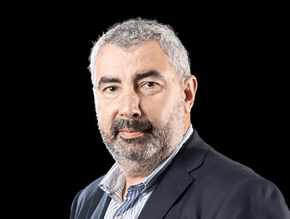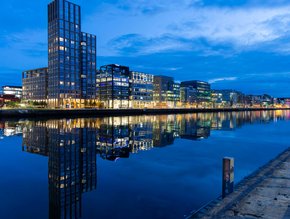Sustainability is Central to Hyperscalers’ Strategies

The backbone of today’s digital infrastructure, data centres have been a much-maligned presence in the global mission to reach sustainability goals. Famously responsible for around 1% of global electricity consumption, power-intensive workloads such as AI and cryptocurrency mining set to cause data centre electricity use to double by 2026, according to a report by the International Energy Agency.
Demand for digital services has grown rapidly in recent years. Since 2010, the number of internet users worldwide has more than doubled, while global internet traffic has expanded 20-fold. Rapid improvements in energy efficiency have, however, helped moderate growth in energy demand from data centres and data transmission networks. Once notorious for their energy consumption, today’s hyperscalers – the world’s largest data centres – are undergoing a significant shift, with sustainability becoming a central pillar of their strategy.
With the top three cloud providers – AWS, Microsoft and Google – accounting for 65% of the worldwide market, these hyperscalers’ sustainability strategies are transforming the data centre industry, amid growing customer demand for eco-conscious solutions to the increasing economic viability of green technologies.
“Hyperscalers are aggressively investing in sustainable cloud operations and delivery, aspiring to eventually achieve net zero emissions within the decade, or sooner,” said Ed Anderson, Distinguished Research Vice President at Gartner.
According to Gartner, cloud sustainability initiatives will start with the leading cloud providers, which are some of the world’s largest data centre operators and critical to reducing IT-related carbon emissions.
“While essentially all cloud providers have sustainability initiatives in place, their progress in meeting carbon reduction goals and strategies for achieving net zero carbon emissions varies wildly,” said Anderson. “Sustainability metrics and workload placement tools are still immature and not always transparent, making it difficult for organisations to fully and accurately assess true sustainability impacts of their cloud usage today.”
Here, Data Centre Magazine highlights the top three cloud providers globally – AWS, Microsoft and Google – and explores their sustainability strategies.
The hyperscalers: AWS is leading the charge
AWS is the world’s most comprehensive and broadly adopted cloud offering, with millions of global users depending on it every day. The company is designing data centres that provide the efficient, resilient service its customers expect while minimising its environmental footprint.
The world’s largest corporate purchaser of renewable energy, Amazon has set ambitious sustainability goals, including reaching net-zero carbon emissions by 2040 and using 100% renewable energy by 2025 - five years ahead of the company’s original target of 2030.
AWS says that its infrastructure is five times more energy efficient than typical European data centres, and 3.6 times more efficient on average than those in the US. Across Amazon, in 2022, 90% of electricity consumed came from renewables.
“We are determined to be inventive and relentless, as we work to make the cloud the cleanest and the most energy-efficient way to run all of your infrastructure and your business,” describes Adam Selipsky, CEO at AWS.
Microsoft aims to deliver on 2030 sustainability commitments
Microsoft has set an ambitious goal to become carbon negative by 2030, while by 2050 the company says it will have removed its historical emissions since its founding in 1975.
Microsoft’s data centres are designed to maximise energy efficiency, which substantially cuts both electricity usage and its ecological footprint. Microsoft is steadily progressing in terms of renewable energy, targeting a shift to 100% renewable by 2025.
Azure places high urgency on water conservation, employing advanced cooling methods that reduce water consumption. In 2022, it launched Microsoft Cloud for Sustainability, a comprehensive suite of enterprise-grade sustainability management tools. Microsoft has also helped to advance a set of global sustainability initiatives that aim to benefit every person and organisation on the planet.
“Microsoft’s own sustainability is our first sphere of influence, and we remain focused on getting our own house in order and delivering on our 2030 commitments,” commented Melanie Nakagawa, Microsoft’s Chief Sustainability Officer, and Brad Smith, its Vice Chair and President, in a 2023 report. “We made ambitious commitments in 2020 and we knew that progress would not always be linear. These commitments are rooted in science and take the necessary steps to protect our ecosystems and prevent the most severe impacts of climate change. We are firmly focused on achieving our 2030 commitments and making the right long-term investments that support the sustainability of our business for decades to come.”`
Google is heavily investing in sustainability research and development
Since 2007, Google has maintained a carbon-neutral status, balancing its carbon footprint with offsets and prioritising renewable energy sources for its operations that support organisations globally. Impressively, Google matched its electricity consumption with 100% renewable energy since 2017.
With a goal to operate all of its data centres and office campuses on 24/7 carbon-free energy by 2030, Google is heavily investing in sustainability research and development to create new technologies that can help reduce waste and conserve resources from machine learning to help cool its data centres to smart thermostats that conserve home energy. The company started purchasing renewable energy in 2010, and in 2017 became the first major company to match 100% of its annual electricity use with renewable energy purchases.
Its data centres are models of energy efficiency, using advanced cooling methods and artificial intelligence to optimise energy usage. The company's approach extends beyond energy management, encompassing sustainable building designs, responsible supply chain partnerships, and innovative water conservation strategies, including seawater cooling and reusing wastewater.
“We've matched 100% of our global electricity use with renewable energy purchases for the last six years – a goal that seemed almost crazy when we set it in 2012,” explains Benedict Gomes, SVP, Learning & Sustainability at Google. “Today our ambitions have evolved—we now have a bold goal to achieve net-zero emissions across all of our operations and value chain, and as part of that goal, to run on 24/7 carbon-free energy on every grid where we operate.
“The path to get to these goals is difficult, and we’re committed to working through the challenges we face with the ultimate aim of driving larger systems change to create a more sustainable future. Further, predicting the future growth of energy use and emissions from AI compute in our data centers is difficult. Despite this, we remain focused on developing new ways to make AI computing more efficient while leveraging the opportunities that AI presents to have a positive environmental impact.”
******
Make sure you check out the latest edition of Data Centre Magazine and also sign up to our global conference series - Tech & AI LIVE 2024
******
Data Centre Magazine is a BizClik brand







